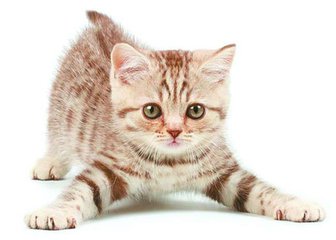猫咪教我的那些事
A philosopher once assured me, many years ago, that he had converted his cat to veganism1. Believing he was joking, I asked how he had achieved this feat. Had he supplied the cat with mouse-flavoured vegan food? Had he presented his cat with other cats, already practising veganism, as feline role models? Or had he argued with the cat and convinced it that eating meat is wrong? My interlocutor2 wasn’t amused, and I realised that he really believed the cat had opted for a meat-free diet.
The independence of cats is one of the features most admired by those of us who love them. Having entered into close proximity with human beings, cats were quickly recognised as being useful to them.
For many cat lovers, I suspect what they cherish is not how cats resemble us, but their differences from us. Living with cats opens a window into a world beyond our own and teaches us something important about what it means to be human.
One of the most attractive features of cats is that contentment is their default3 state. Unlike human beings—particularly of the modern variety—they do not spend their days in laborious pursuit of a fantasy of happiness. They are comfortable with themselves and their lives, and remain in that condition for as long as they are not threatened. When they are not eating or sleeping, they pass the time exploring and playing, never asking for reasons to live. Life itself is enough for them.
If there are people who can’t stand cats—and it seems there are many—one reason may be envy. As Jeffrey Masson, whose The Nine Emotional Lives of Cats is the best book on cats ever published, has written:
In English, if not in “cat”, the word contentment conveys something of a feeling of being at peace with the world or with yourself. It is more of a state than a fleeting emotion. A person can be happy (momentarily) without being content. Contentment cannot be purchased; happiness, on the other hand, has a price.
Whereas human beings search for happiness in an ever-increasing plethora4 of religions and therapies, cats enjoy contentment as their birthright. Why this is so is worth exploring. Cats show no sign of regretting the past or fretting5 about the future. They live, absorbed in the present moment. It will be said that this is because they cannot envision6 the past or future. Perhaps so, though their habit of demanding their breakfast at the accustomed hour shows they do have a sense of the passage of time. But cats, unlike people, are not haunted by an anxious sense that time is slipping away. Not thinking of their lives as stories in which they are moving towards some better state, they meet each day as it comes. They do not waste their lives dreading the time when their lives must end. Not fearing death, they enjoy a kind of immortality. All animals have these qualities but they seem particularly pronounced7 in cats. Of all the animals that have lived closely with human beings, cats must surely be the least influenced by them.
“When I play with my cat,” Montaigne8 wrote, “how do I know she is not playing with me?” With creatures that can be understood only partly by us, one can only speculate about their inner life. Yet it is tempting to suppose that the secret of feline contentment is that cats have no need to defer to a picture of themselves as they imagine they should be.9 Certainly they have a sense of dignity: they avoid people who treat them disrespectfully, for instance. Yet cats do not struggle to remake themselves according to any ideal self-image. Not inwardly10 divided, they are happy to be themselves.
The moralizing11 philosopher who believed he had persuaded his cat to adopt a meat-free diet only showed how silly philosophers can be. Rather than seek to teach his cat, he would have been wiser to learn from it, as Montaigne did. Living in accord with their nature, cats do not need moral instruction. Dissatisfaction with our natural condition, on the other hand, seems to be natural for human beings. The human animal never ceases to strive for some higher form of life. Cats make no such effort. Without any process of laborious cogitation, these lucid, playful and supremely adaptable creatures already know how to live.12
作者:By John Gray
很多年从前,有一位哲学家曾信誓旦旦地和我说,他让他的猫学会了吃纯素。我认为他是恶作剧,便问他是怎么完成这一个豪举的。是给猫供给了老鼠口味的素食吗?仍是经过其他猫成功茹素的事例给他的猫树立了典范?又或许从前和他的猫争辩并使它信任吃肉是不对的?但是我面前的这位仁兄并没有被逗笑,这让我认识到他真的认为是他的猫自己挑选了茹素。
在猫的种种特质中,咱们这些爱猫人士最赏识的一点便是它的独立性。当猫与人的联系变得密切之后,人们很快就认识到了猫的重要作用。
猫咪教我的那些事
http://www.021lunwen.com/syy/zxyy/201709/56559.html